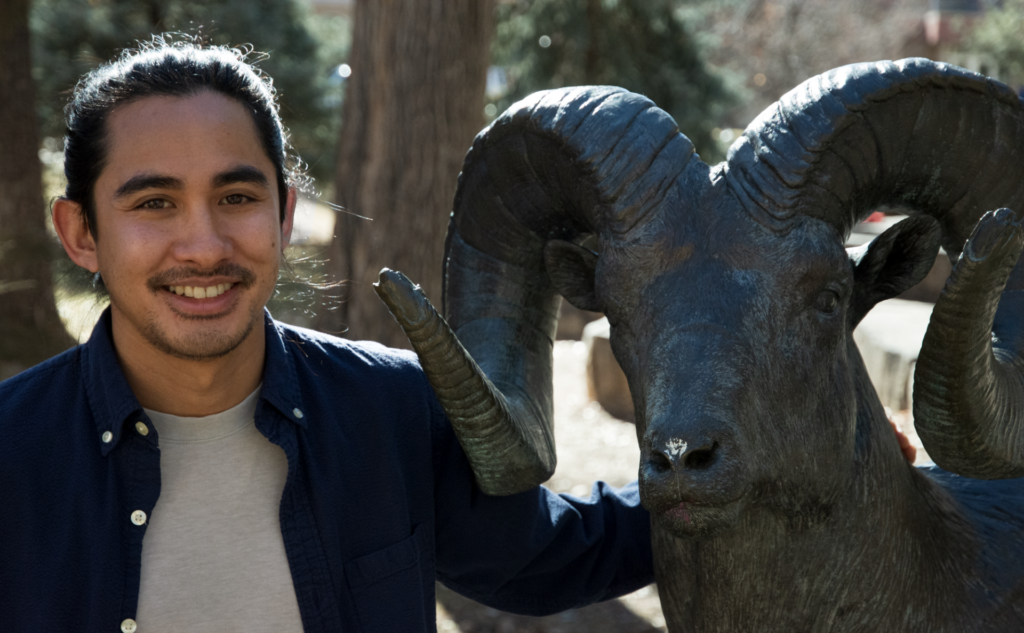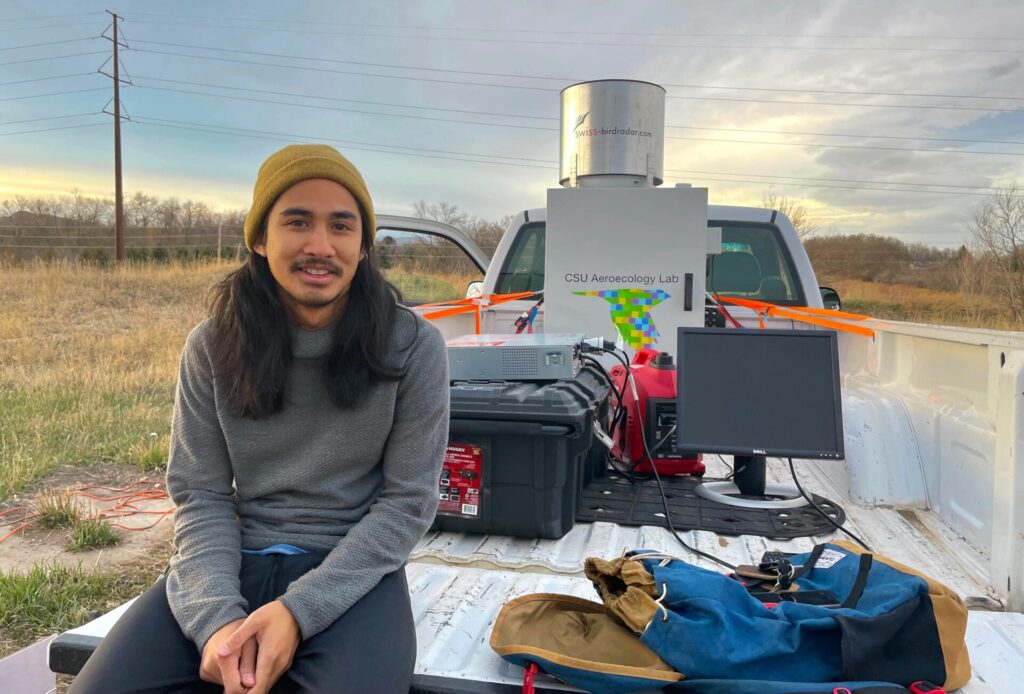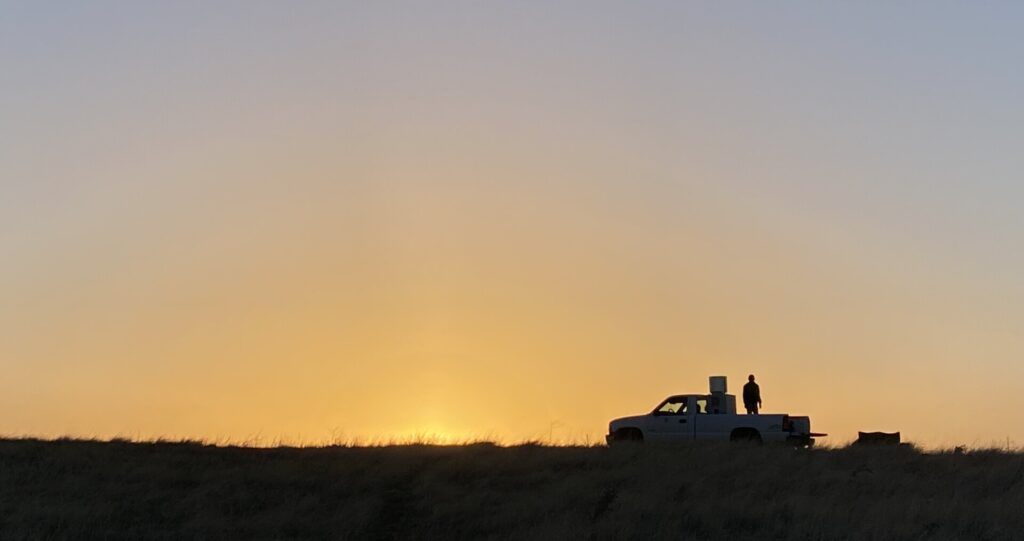
Conservationist Aldo Leopold once said, “One of the penalties of an ecological education is that one lives alone in a world of wounds.” For some people, knowledge of ecological issues leads to sorrow and apathy. For others, it leads to action.
Miguel “Mikko” Jimenez chose action. And he is building a supportive community to achieve his goal of centering environmental justice in his conservation work.
While ecologists may see environmental degradation more clearly than non-scientists, many people are dedicating their careers to restoration and conservation. Some have served as mentors to Jimenez. Now, he hopes to do the same for others.
In April, Colorado State University’s Graduate School awarded Jimenez the 2024-25 Advancing Education Scholarship in honor of the legacy and memory of Martin Luther King Jr. Jimenez received the award in recognition of his outstanding achievement in promoting equities in education for underrepresented and racially minoritized students. The Graduate Center for Inclusive Mentoring in the Graduate School oversaw the selection process.
“You can’t really do science without funding, and often funding comes with certain limitations. I’ve been looking for opportunities to align my research with advocacy,” said Jimenez, a Ph.D. candidate studying ecology. “The Advancing Education award will allow me to ask questions that are important to advancing environmental justice, and I am so grateful for the opportunity.

Advocating for change
Jimenez’s awareness of environmental justice grew over time. He was interested in research after college but didn’t know where or what to study. So, he began working at the Urban Wildlife Institute in Chicago and started to see the city he grew up in through an entirely new lens. How the ecological makeup of Chicago related to the social and political aspects of Chicago started to become clear.
Then he met Liba Pejchar, a professor at CSU, who Jimenez later chose as his advisor to obtain his master’s degree in ecology. He was drawn to her lab’s focus on how ecology and social factors interact.
After obtaining his master’s degree he began working at Audubon Society, where he began reconsidering the role of science in social justice. In this role, he met folks who’d been working on environmental justice for decades and saw how it was possible to keep credibility as a scientist while also speaking out about issues. Jimenez served as the co-chair of Audubon’s People of Color Affinity Group’s Professional Development Committee and facilitated the development of the organization’s first mentorship program for underrepresented staff.
In 2021 he left the Audubon Society to further his research career by pursuing a Ph.D. in the Graduate Degree Program in Ecology.
The power of experience
Last year Jimenez was a fellow in the 2023 Environmental Fellows Program at the Yale School of the Environment. As an EFP fellow, Jimenez spent months analyzing infrastructure data in East Harlem so that the city could make decisions about infrastructure improvements based on the data he analyzed.
“I realized then that data needs to be informed by lived experience,” said Jimenez. “Decision-makers cannot understand urgency from numbers alone; they need to experience what it feels like to live in an area that’s been historically disinvested in and hear how those decisions affect people.”
Jimenez realized this while touring the city with residents to observe the infrastructure he had been analyzing. The tour was during one of the hottest summers in New York. Despite knowing from spatial analysis that heat island effect was an issue for residents, the impact of experiencing it himself and engaging with residents strengthened his desire to make positive changes.
When Jimenez was a YSE fellow he was mentored by one of his heroes – Dorceta Taylor. “She was one of the founders of the environmental justice movements, and the focus of the program was on bringing more people of color into the environmental movement and connecting them,” said Jimenez. “Now I’m trying to do the same thing.

From classroom to community
Although Jimenez believes that research can lead to real change, he wanted to see more immediate and tangible impacts in his work, so he joined the City of Fort Collins Climate Equity Committee to connect with people who are working on the same issues he’s trying to address. He aims to be a voice for residents who might not have the time for or trust in the bureaucratic processes that shape cities.
He also started interning in CSU’s Forestry Department, where he uses spatial analysis tools to help them make equitable decisions about natural resources. The data that Jimenez collects and analyzes can be used to make decisions like where the city should plant trees based on canopy cover, which Jimenez notes is usually in less wealthy neighborhoods.
Jimenez will continue to focus on connecting with others who are working to find solutions and introducing new people to the cause.
“A mentor once told me that in this field, at some point you’re going to feel like you’re inadequate or even an impostor – but this is a normal part of the growing process. Don’t let that stop you from taking a chance,” Jimenez said. “To young professionals, I echo this: Feeling like you don’t belong, especially as an underrepresented person, is normal. Keep pushing forward.”